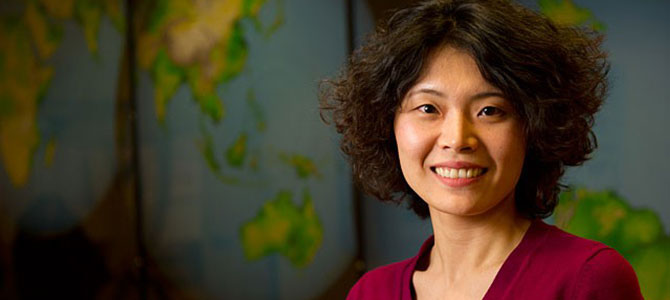 PHOTO: TIM SCHOON/UNIVERSITY COMMUNICATION AND MARKETING
Suyun Ma, International Programs' first external global relations coordinator, helps Iowa alumni and prospective students in China connect with the UI online.
PHOTO: TIM SCHOON/UNIVERSITY COMMUNICATION AND MARKETING
Suyun Ma, International Programs' first external global relations coordinator, helps Iowa alumni and prospective students in China connect with the UI online. Strolling down the street one day, Suyun Ma bumped into a famous Chinese writer. The encounter didn't take place in her native land but in Iowa City, where author A Lai was participating in the UI's International Writing Program and Ma was working on her doctorate in urban and regional planning.
The meeting would never have happened in Ma's hometown of Hangzhou, the capital of Zheijiang Province in eastern China with a population of more than eight million people—and the opportunity to mingle with writers and academics from around the globe is one of the many reasons Ma loves Iowa City. Now, as UI International Programs' first external global relations coordinator, Ma, 10MS, shares such stories on social media to give prospective Chinese students and their parents a taste of UI campus life.
Reflecting a national trend, the number of Chinese students at Iowa has surged in recent years from 537 in 2007 to 2,266 in 2013. One of those students, Ma came to the UI in 2008 to pursue a master's degree and then a doctorate. She is currently finishing her dissertation and auditing a UI mass communication seminar while working full-time in her new position.
Thanks to Ma's work, the UI is ahead of other American universities in sending its message via Chinese social media platforms such as Renren (similar to Facebook), Weibo (like Twitter), Youku (like YouTube), and WeChat (a mobile app for smart phones). With WeChat's popularity in South America rising, the university also plans to add a Spanish account.
In addition to communicating through social media, Ma helps establish academic collaborations around the globe and coordinate international projects, such as the UI's recent official trip to China and an alumni event in Beijing. She works with the alumni association to reconnect with thousands of Iowa grads worldwide—including with Chinese Hawkeyes in their native Mandarin.
Through her social media efforts, Ma hopes to enhance the UI's visibility on the global stage. "We are already one of the most internationalized universities in this country, but we want to move even further in that direction," she says. "[International collaboration is] very beneficial for students because it helps prepare them to be leaders in the global community."

